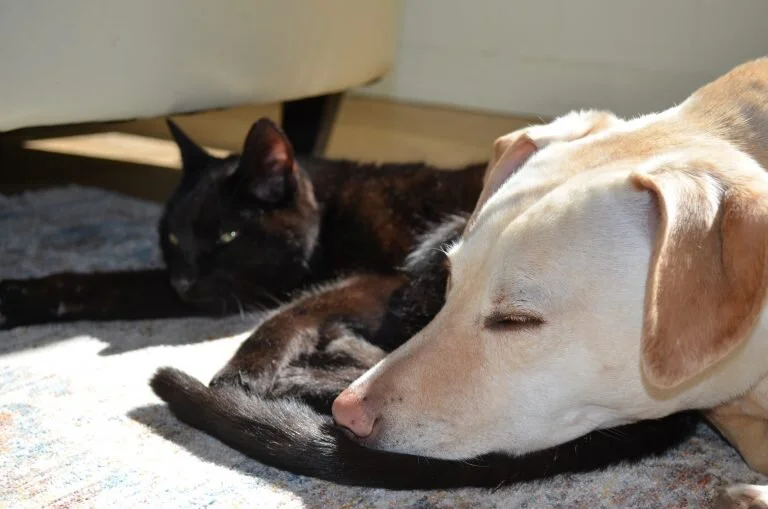An Unlikely Pair
Boo and Ade sit next to the fence with their backs facing the house. They sit side-by-side like mirror images, ears up, shoulders straight, resting on their bums. They are an unlikely pair. Boo is a fifteen-year-old black cat and Adriana is a five-year-old white dog. Together, they smash every stereotype and cliché I’ve ever heard about the rocky relationship between cats and dogs. They’re watching something through the chainlink fence, something I can’t see. But I trust it’s there, and I trust they’ll kill it.
I also trust in the evening when I go to the basement, I’ll find their trophy. Over the past few weeks, they’ve left me lizards, mice, moles, birds, and chipmunks. They leave these dead things as presents, right in front of the stairs so that I can’t possibly miss them. Occasionally, they give me organs or limbs, such as a furry tail or a liver, perfectly intact but grotesquely separated from its owner. I always feel so conflicted. Deep down inside I am touched because I know this is their version of a thank you card, yet at the same time I have to choke back gags.
Boo and Adriana weren’t always so close. During Ade’s first four years, Boo didn’t waste his time on her. For one thing, their personalities were vastly different. Boo is the epitome of cool; he’s black and sleek with ultra-smooth mannerisms. On the other hand, until about six months ago, Adriana still acted like a perpetual goofball who ransacked rooms within minutes and didn’t understand personal space. She’s matured a lot recently, and he noticed.
Boo’s brothers were another reason he wasn’t always close with Adriana. Last spring, three black cats lived at the Farnival. They were inseparable, but now, Boo is the only one left. Goo died of old age in early summer, and Fuzz simply disappeared during autumn, when the leaves were just starting to fall from the trees. The last time I saw Fuzz he was in a forest drenched in yellow. For a long time, I hoped he’d return, even had dreams of him showing up at the tree line as quietly as he left. Eventually, I had to let go.
It took Boo two weeks to let go of Fuzz. I’ve never seen an animal so clearly grieve for another before. We’ve lost several elder pack members over the years, but the remaining dogs always acted with more curiosity than sadness. Even when Goo died, Boo seemed to confront it with the same grace as most animals confront death. He simply moved on. But when Fuzz disappeared, he acted completely different.
Through my office window, I’d watch his thin silhouette jog to the bottom of the yard. Then he’d spend thirty minutes pacing back and forth across our fenced half-acre, calling and calling for Fuzz. Boo cried several times a day for fourteen days straight. His grief broke my heart, and we considered…considered adopting another cat. But then, Boo discovered Adriana, and he stopped crying for a brother who never showed up.
I first noticed Boo and Ade’s blossoming relationship when I caught them napping on the same dog bed. In the beginning, they acted tentative towards each other and occupied opposite ends. Boo mostly pretended like Ade didn’t exist, while Ade glanced sideways every few seconds, as though any minute he might break out his razor-sharp claws. It’s happened before. The dogs have scars to prove it. But as they began to trust each other, they moved from opposing ends to the center.
Now, Boo naps sprawled over Adriana’s ribcage or crawled into a noodle against her stomach. Now, he allows her to clean his ears, and Ade lets him nuzzle her snout. On occasion, when they nap, some sound startles Adriana. She’ll jump up and send Boo flying in the air. He lands with grace and an indignant meow. But on cold winter days or rainy spring afternoons, they sleep next to each other for hours.
At some point, Boo started looking for Adriana during the middle of the night. A few nights a week, after his midnight haunts, he creeps through the doggie door, then pitter-patters down the hallway. In the bedroom doorway, he meows for Adriana. I don’t know how she answers, because she’s under the covers and doesn’t make a sound. But, when he determines she’s there, he tunnels underneath the sheets until he finds her. Ade spends a few minutes sniffing him, and he spends another minute cleaning her fur. Then, they settle around each other in a shape that reminds me of the traditional yin-yang symbol, white spooned against black. We all sleep cocooned together until dawn.
Ade outweighs Boo by thirty pounds, but in their hunting poses at the edge of the spring-bright grass, he looks like her shadow. I realized their relationship had reached next-level status when I first saw them hunting together, a recent but now frequent activity. It’s, by far, the most conclusive evidence that they’ve moved beyond sharing body heat, beyond coexisting in the same space. Now, they are choosing to spend time with each other outside of the house. Despite all their differences and all the stereotypes, these two animals are friends.
Is Ade becoming more cat or is Boo becoming more dog? If I had to guess it’d be the former. Ade is as insecure as he is confident. Besides, she’s probably in awe of his athletic efficiency, especially at killing things. And he must, in his own aloof feline way, be proud of her patience and size. Who knows? Maybe, just maybe, their relationship is on equal ground, maybe they accept each other because of their differences.
That evening I walk down the basement steps and in the center of the landing is a frog without a leg, a thank you card from an unlikely pair.





